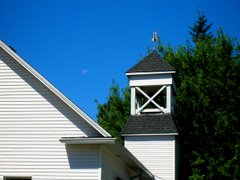a funeral sermon
from "God's Trombones: Seven Negro Sermons in Verse"
by James Weldon Johnson
preached by Cynthia O'Brien August 28, 2006
at Smith Memorial Presbyterian Church
(This book is available from your favorite bookseller. Get an audio recording if you can.)
GO DOWN DEATH -- A FUNERAL SERMON
Weep not, weep not,
She is not dead;
She’s resting in the bosom of Jesus
Heart-broken husband – weep no more;
Grief-stricken son – weep no more;
Left-lonesome daughter – weep no more;
She’s only just gone home.
Day before yesterday morning,
God was looking down from his great, high heaven,
Looking down on all his children,
And his eye fell on Sister Caroline,
Tossing on her bed of pain.
And God’s big heart was touched with pity,
With the everlasting pity.
And God sat back on his throne,
And he commanded that tall, bright angel standing at
His right hand:
Call me Death!
And that tall, bright angel cried in a voice
That broke like a clap of thunder:
Call Death! – Call Death!
And the echo sounded down the streets of heaven
Till it reached away back to the shadowy place,
Where Death waits with his pale, white horses.
And Death heard the summons.
And he leaped on his fastest horse,
Pale as a sheet in the moonlight.
Up the golden street Death galloped,
And the hoofs of his horse struck fire from the gold,
But they didn’t make no sound.
Up Death rode to the Great White Throne,
And waited for God’s command.
And God said: Go down, Death, go down,
Go down to Savannah, Georgia,
Down in Yamacraw,
And find Sister Caroline.
She’s borne the burden and heat of the day,
She’s labored long in my vineyard,
And she’s tired –
She’s weary –
God down, Death, and bring her to me.
And Death didn’t say a word,
But he loosed the reins on his pale, white horse,
And he clamped the spurs to his bloodless sides,
And out and down he rode,
Through heaven’s pearly gates,
Past suns and moons and stars;
On Death rode,
And the foam from his horse was like a comet in the sky;
On Death rode,
Leaving the lightning’s flash behind;
Straight on down he came.
While we were watching round her bed,
She turned her eyes and looked away,
She saw what we couldn’t see;
She saw Old Death. She saw Old Death
Coming like a falling star.
But Death didn’t frighten Sister Caroline;
He looked to her like a welcome friend.
And she whispered to us: I’m going home,
And she smiled and closed her eyes.
And Death took her up like a baby,
And she lay in his icy arms,
But she didn’t feel no chill.
And Death began to ride again –
Up beyond the evening star,
Out beyond the morning star,
Into the glittering light of glory,
On to the Great White Throne.
And there he laid Sister Caroline
On the loving breast of Jesus.
And Jesus took his own hand and wiped away her tears,
Ane he smoothed the furrows from her face,
And the angels sang a little song,
And Jesus rocked her in his arms,
And kept a-saying: Take your rest,
Take your rest, take your rest.
Weep not – weep not,
She is not dead;
She’s resting in the bosom of Jesus.
